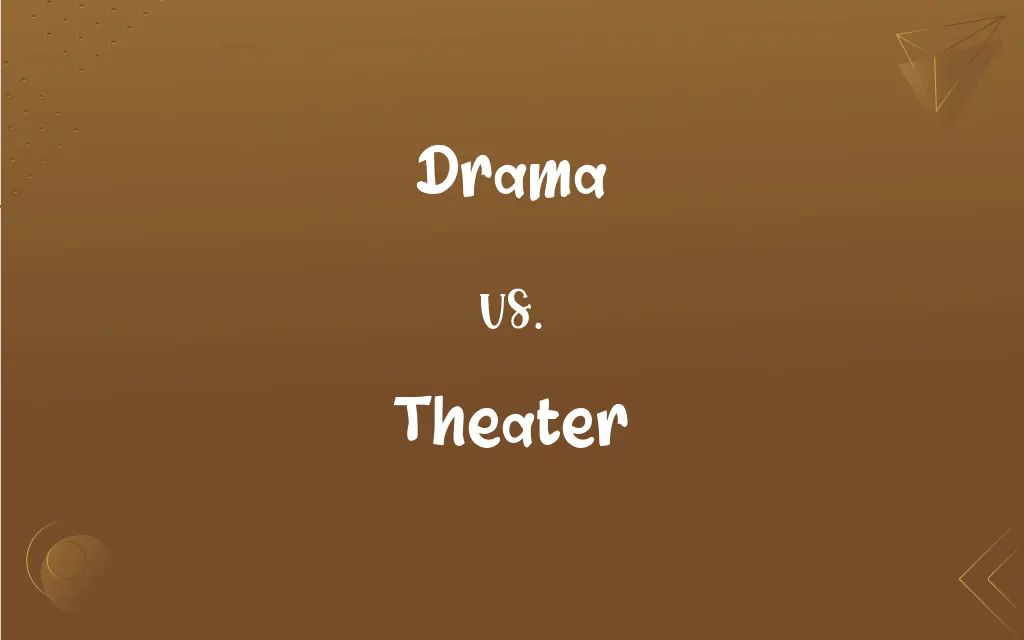Drama vs. Theater: What's the Difference?
Edited by Janet White || By Harlon Moss || Updated on October 4, 2023
Drama refers to a genre or style of performance, while theater is the venue or medium in which such performances are staged.

Key Differences
Drama encapsulates a range of performances, often showcasing human experiences and emotions. On the other hand, theater denotes the place or space where such dramatic works are performed.
Drama can exist in various forms like plays, television shows, or movies, focusing on storytelling and character development. Conversely, theater is not just about the physical space but encompasses the entire art form, including staging, lighting, costumes, and presentation.
While a drama is essentially the script or content of the performance, theater is the holistic embodiment of that script, brought to life with actors, directors, and stagecraft.
One can write or read a drama without it ever being performed, as it can be a literary work in itself. However, theater is intrinsically tied to performance and the act of presenting a drama to an audience.
Drama emphasizes narrative, characters, and themes. In contrast, theater focuses on the act of presentation, the collaborative effort, and the experience shared between performers and audience.
ADVERTISEMENT
Comparison Chart
Definition
A genre or style of performance
A venue or the art of presenting performances
Focus
Narrative, characters, themes
Presentation, staging, collaboration
Existence
Can exist as a literary work
Tied to performance and presentation
Variants
Plays, television shows, movies
Playhouses, amphitheaters, open-air stages
Experience
Primarily for the reader or viewer
For both the performer and the audience
ADVERTISEMENT
Drama and Theater Definitions
Drama
Drama is a performance genre emphasizing narrative.
She was drawn to the intense emotions displayed in the drama.
Theater
Theater encompasses the art of staging performances.
She pursued a degree in theater to understand the nuances of stagecraft.
Drama
Drama showcases fictional or real-life events.
The historical drama portrayed the life of the ancient queen.
Theater
Theater is a venue for performing arts.
They booked tickets for the new show at the downtown theater.
Drama
Drama is a scripted performance with characters and plot.
The drama unveiled the complexities of human relationships.
Theater
Theater focuses on the presentation of dramatic works.
The experimental theater group introduced innovative staging techniques.
Drama
Drama can be a written work, not necessarily performed.
He read the drama, visualizing the scenes in his mind.
Theater
Theater bridges the performers with the audience.
The intimate theater allowed the audience to closely engage with the performance.
Drama
Drama often delves into human emotions and experiences.
The family drama highlighted the intricacies of sibling relationships.
Theater
Theater is a collaborative medium involving various professionals.
The success of the production was a testament to the theater team's hard work.
Drama
A prose or verse composition, especially one telling a serious story, that is intended for representation by actors impersonating the characters and performing the dialogue and action.
Theater
A building, room, or outdoor structure for the presentation of plays, films, or other dramatic performances.
Drama
A serious narrative work or program for television, radio, or the cinema.
Theater
A room with tiers of seats used for lectures or demonstrations
An operating theater at a medical school.
Drama
Theatrical plays of a particular kind or period
Elizabethan drama.
Theater
Dramatic literature or its performance; drama
The theater of Shakespeare and Marlowe.
FAQs
Can a drama exist without being performed?
Yes, a drama can exist as a literary work without ever being staged in a theater.
Can there be a drama without any characters?
While characters are central to most dramas, some experimental pieces might focus on themes or abstract concepts without defined characters.
Who are the main professionals involved in theater?
Theater involves actors, directors, stage managers, lighting and sound technicians, costume designers, and more.
Are all plays performed in a theater?
While many plays are performed in a theater, some can be staged in other venues or even outdoors.
How does a drama's script translate to a theater production?
A drama's script provides the narrative and dialogue, which the theater production then interprets, stages, and performs for an audience.
What are some famous theater districts globally?
Some famous theater districts include Broadway in New York, the West End in London, and the Kabuki-za in Tokyo.
What's the relationship between drama and theater in education?
In education, drama often refers to the study and practice of performance, while theater might encompass a broader curriculum including the history, production, and technical aspects of staging performances.
What is the primary focus of drama?
Drama primarily focuses on narrative, characters, and themes.
Where can dramas be performed?
Dramas can be performed in a theater, on television, or even in films.
What's the difference between a drama class and a theater class?
A drama class might focus more on the craft of acting and storytelling, while a theater class can encompass a broader range of topics including stagecraft, production, and theater history.
How does drama influence theater?
Drama provides the content and narrative structure, which theater then brings to life through performance and staging.
Can a building like a cinema be called a theater?
Yes, a cinema can be referred to as a movie theater.
Are musicals a part of theater?
Yes, musicals are a genre within theater that combine songs, spoken dialogue, acting, and dance.
How do modern dramas differ from classical ones?
While classical dramas might follow established structures or themes from history or mythology, modern dramas often explore contemporary issues and can be more experimental in form.
What's the primary purpose of a theater?
The primary purpose of a theater is to present performances, often dramas, to an audience.
Can one be involved in theater without being an actor?
Absolutely, theater involves a range of professionals, from directors and writers to technicians and designers.
Can a drama be improvised?
Yes, while many dramas are scripted, there are improvisational dramas where performers create the narrative on the spot.
What's essential for a theater production?
A theater production involves staging, lighting, costumes, actors, directors, and often an audience to view the performance.
Can a movie be considered a drama?
Yes, a movie can belong to the drama genre, emphasizing narrative and character development.
Do all dramas have to be serious?
No, dramas can range from serious to comedic, tragic to farcical, or anywhere in between.
About Author
Written by
Harlon MossHarlon is a seasoned quality moderator and accomplished content writer for Difference Wiki. An alumnus of the prestigious University of California, he earned his degree in Computer Science. Leveraging his academic background, Harlon brings a meticulous and informed perspective to his work, ensuring content accuracy and excellence.
Edited by
Janet WhiteJanet White has been an esteemed writer and blogger for Difference Wiki. Holding a Master's degree in Science and Medical Journalism from the prestigious Boston University, she has consistently demonstrated her expertise and passion for her field. When she's not immersed in her work, Janet relishes her time exercising, delving into a good book, and cherishing moments with friends and family.































































